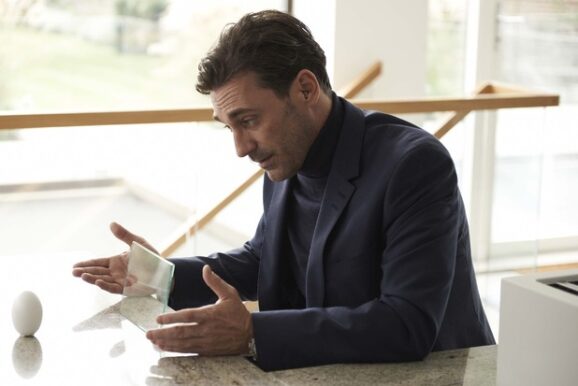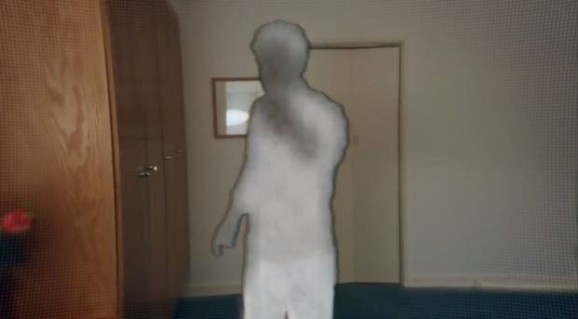Black Mirror’s Christmas Episode May Keep You Awake Long Enough To See Santa
 Black Mirror is indeed black — it’s one of the darkest technological dystopias I’ve ever seen, and without a doubt the most relevant, especially given its emphasis on social media. And the name of its Christmas episode, “White Christmas,” is perfect — it sets the viewer up for the irony ahead. This “White Christmas” isn’t the idyllic, snow-covered holiday extravaganza its title suggests. In true Black Mirror fashion, darkness descends, even at the most wonderful time of the year.
Black Mirror is indeed black — it’s one of the darkest technological dystopias I’ve ever seen, and without a doubt the most relevant, especially given its emphasis on social media. And the name of its Christmas episode, “White Christmas,” is perfect — it sets the viewer up for the irony ahead. This “White Christmas” isn’t the idyllic, snow-covered holiday extravaganza its title suggests. In true Black Mirror fashion, darkness descends, even at the most wonderful time of the year.
The 90-minute episode weaves together three plotlines, as this show often does. It starts with Matthew (Mad Men‘s Jon Hamm) in a secluded cabin with a roommate with whom he apparently hasn’t spoken in years. Black Mirror characters often have problems communicating, at least without digital/technological means — and we’ll get to that. It becomes clear that both characters have skeletons in their closets and are likely hiding out. The first third of the movie is about Matthew’s crime, the second about Matthew’s high-tech job, and the third about his roommate Joe’s crime.
In the first third, we see Matthew orchestrating a Cyrano situation for an awkward client who wants to pick up a girl at a Christmas party. Matthew can see everything through an “eye link” and chatters in the nervous guy’s ear, given him pointers in flirting and socializing. As the guy approaches a pretty girl, Hamm feeds him information about who she is, her interests, etc. — he can access information about the crowd via face recognition and, of course, photos and events posted on social media.
This segment tells us a lot about how we interact with each other and what we can learn from observing body language, facial cues, voice tone, etc. It might seem like this is obvious stuff, but these are skills are rapidly becoming a lost art as our interactions get moved into virtual forums. “Ninety percent of seduction is just listening,” Matthew says — something that’s getting harder and harder, given all the chatter these days.
The theme of the episode is that everyone tries to get into everyone’s head, and sometimes people succeed. Those voices come from all different places — from the media, from other people, from ourselves — and the origin of those voices, in many ways, guides the three plot lines of the episode, as does the question “Which voice do we listen to?”

Both Matthew and Joe have been “blocked” because of their transgressions — the same concept we have when it comes to preventing someone from accessing our information via social media. But in this episode of Black Mirror, blocking works in the real world, which results in excising someone from the past and present of the blocker’s life, eliminating any possibility for resolution or closure, and essentially taking away the voice of the person who’s been blocked.
The concept links to another one central to the episode: the idea that, via surgery, someone can essentially copy her consciousness and then use it to help run her life. The patient in this segment is played by Oona Chaplin, who wants the luxury procedure from “Smartelligence.” Sometimes, the world gets so busy that we wish there were two of us. In this episode, there can be. The mini version of Oona is terrified and bored to near insanity, trapped inside the virtual world while the real version of Oona continues living, ultimately benefiting from the convenience of having a digital version of herself augmenting her reality by preparing her coffee in the morning, adjusting the temperature of the house, etc. It’s like having a Nest thermostat controlled not by sensors and wires, but by an iteration of oneself.
There’s so much we can’t control. What if we could capture our own brains and give them the ability to rule our lives? Would that mean it’s us in control? This is an upgraded version of the service Matthew offers the awkward guys — it cuts out the middle-man and lets a version of one’s own brain do the talking. This technology raises some interesting and terrifying questions about the self. Is this secondary self an actual self, or just code? The question dovetails interestingly into questions about whether uploads of our mind files would be us or not — questions raised by recent science experiments, such as the uploading of a worm brain into a robot’s body.
In the final third of the episode, the focus shifts to Joe and his past, which involves being blocked by a lover and resorting to stalking her and doing some pretty desperate and horrible stuff. After a bout of drinking he admits all this to Matthew, who seems to be part of extracting the confession (I won’t give away all the details). Ultimately, Matthew ends up wandering about in a world in which he looks like a blur to everyone else, and everyone else looks like a blur to him. Of course, there’s one final twist, as it becomes clear that the players aren’t entirely in control of their own realities. It’s a bit like the Matrix, except far creepier, and far more realistic.
Merry Christmas, Black Mirror. I’m officially a little more terrified of the future. Guess it’s time to spike the eggnog. You can catch the episode on Christmas on DirectTV’s Audience channel.









